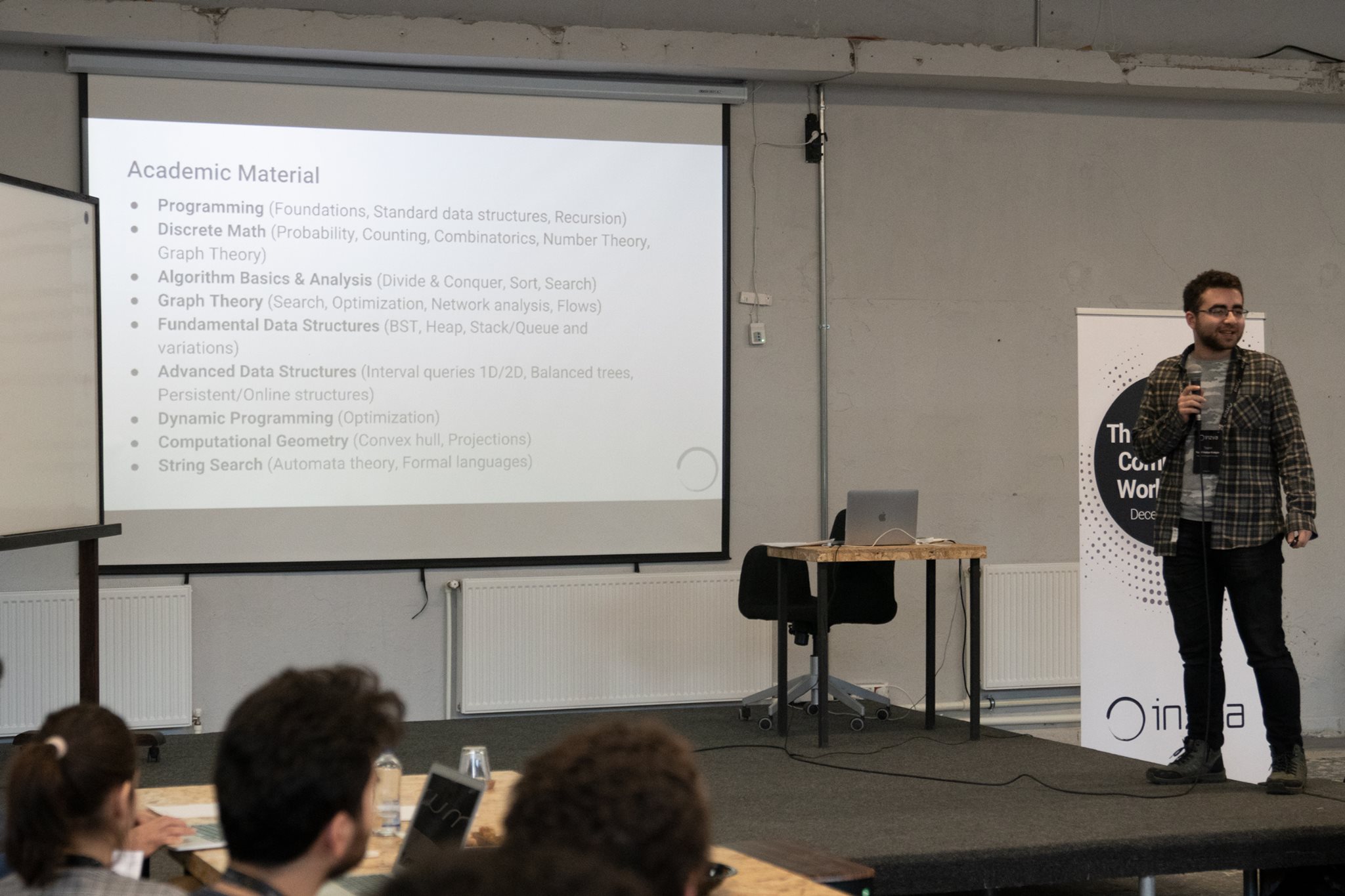Algorithm Community Workshop II
On December 23, inzva welcomed many esteemed academics as well as talented students to hold the second edition of inzva’s annual Algorithm Community Workshop. We spent the day brainstorming about the future of university-level algorithm competitions and communities in Turkey and discussed the ways to build an adequate system that would help students make connections in the community and create effective teams.
Thanks to our guest academic from Ukraine, Vasyl Biletskyy, we also had the opportunity to learn about Ukraine’s experience of building their own algorithm community, which was the first step towards a future collaboration between the two countries for the common goal of “having better programmers”.
Algorithmic thinking improves the students’ academic performance and interview skills
The workshop began with an introductory session where our members talked about the previous year’s activities and the guest academics gave a brief background about their academic focus. Then, one of our long-term members and academic lead of our algorithm programme Yusuf Hakan Kalaycı took the stage to explain the ways algorithmic thinking contribute both to academic studies and professional career by improving the skills for efficient coding as well as problem solving which constitutes the foundation of academic research. Kalaycı also showed a list of topics covered in the algorithm competition programme and the intensive camps, which are selected for the purpose of getting students prepared for algorithm competitions such as ACM-ICPC and interviews where companies ask algorithm problems for the recruitment process. Following Hakan’s presentation, inzva members Burak Buğrul, Kadir Emre Oto, Yasin Kaya and Kayacan Vesek talked about the kind of algorithm problems encountered in the interviews and ACM-ICPC to further explain the reasons why our curriculum is designed as it is.
We went on to discuss Turkish teams’ placement in the regional contests such as SEERC-ICPC World Finals and carefully evaluated our shortcomings, which pointed out the lack of a system when it comes to university-level encouragement in regards to algorithm education and community. Since there is no such a system, the students who participate in the competitions mostly do not get the opportunity improve themselves as a team and try to tackle each problem individually due to their past experiences. Biletskyy then proceeded to explain how Ukraine was led to have a full-fledged system from having none at all and told us about Algotester, his online platform designed for improving algorithm community through lessons and contests.
A national contest will not only raise awareness, but it will also increase the competition and thus, the quality of education.
As we can see from Ukraine’s experience; three groups must be willing to participate to build a successful algorithm community and functioning teams, as well as students who are interested in the subject, academics/former contestants who will mentor or coach participating students and organizators/enforcers who will hold the events and establish the necessary communication. A national contest appeals to all these groups and will help promoting algorithmic thinking and competitions.
Since, at the high school level, Turkey is active in IOI (International Olympiad in Informatics); one of the scientific committee members, Professor Tolga Can from METU went onto stage to talk about their experience in high school-level competitions and how this experience can be used for university-level competitions such as ICPC. He also highlighted the importance of a national contest which would greatly motivate the students to improve themselves and participate in international competitions for achieving better results.
On the road to ACM-ICPC World Finals, a scientific committee can regulate all aspects of the preparation and participation processes.
Along with inzva, a scientific committee composed of academics and experienced students can help regulate the preparation process by contributing to the curriculum of the programmes including study groups and camps and preparing problems for a national contest. It can also have a great impact on the participation process by motivating students, guiding them to build efficient teams, and establishing a productive system. The committee and inzva will work with student chapters to support teams from Turkish universities to take part in ICPC Regional and World Finals.
Furthermore, we discussed other current topics such as the ways to increase the educational resources and promote equal accessibility to education programmes. As can be seen from the quality and quantity of the outcomes, the workshop proved to be very productive.
OVERALL WORKSHOP OUTCOMES
A consortium will be formed with universities.
This year, we will hold the first national programming contest. “Turkish Programming Contest 2019”
A scientific committee consisting of academicians and experienced students will be established.
We are working on establishing an official protocol between ICPC Foundation and BEV Foundation..
Every year, we will sponsor 10 Turkish teams from various universities to participate in SEERC (Ukraine or Romania).
We will support ACM Student Chapters and CS clubs by providing them educational content related to the algorithm programme and guidance.
You can see a full list of attendees here.
You can see our PowerPoint presentation here.
Subscribe to our newsletter here and stay tuned for more hacker-driven activities.
inzva is supported by BEV Foundation, an education foundation for the digital native generation which aims to build communities that foster peer-learning and encourage mastery through one-to-one mentorship.















